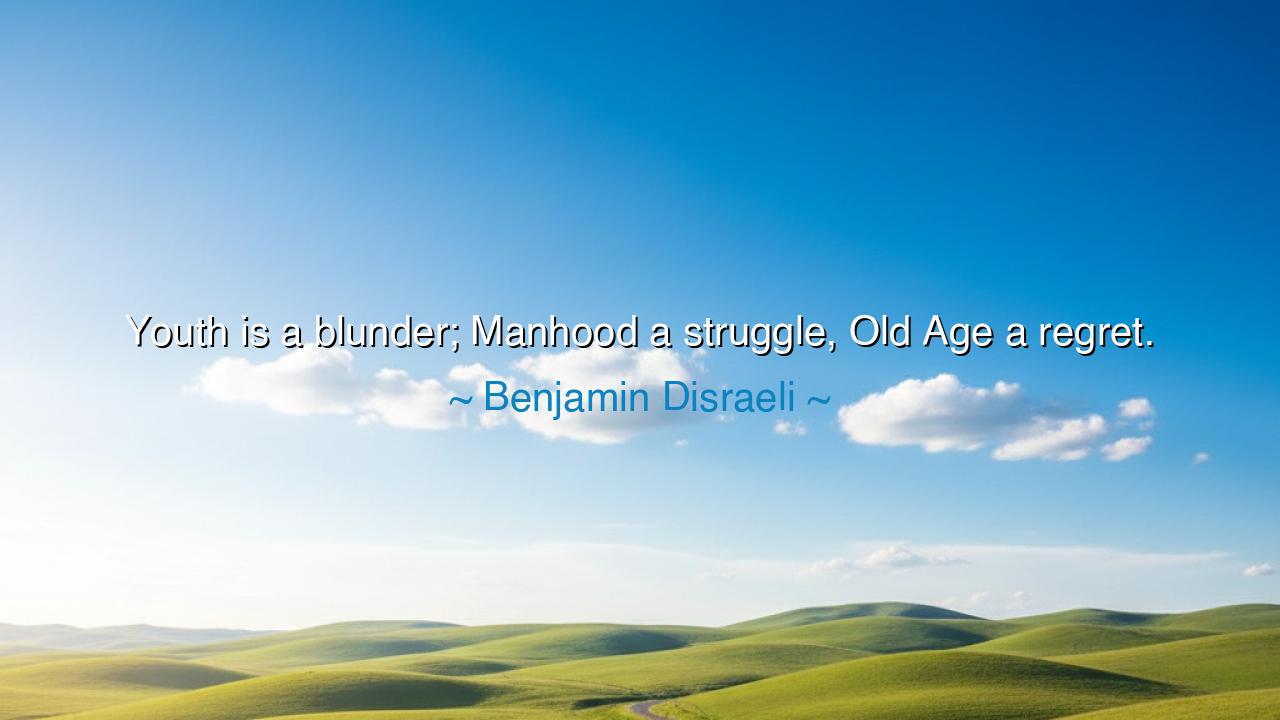
Youth is a blunder; Manhood a struggle, Old Age a regret.






"Youth is a blunder; Manhood a struggle, Old Age a regret." These words by Benjamin Disraeli offer a sobering reflection on the journey of life. In this brief statement, Disraeli encapsulates the human experience, revealing the inherent conflict of each stage of life. Youth, in its exuberance, is filled with mistakes and rash decisions—often the blunder of untamed energy and idealism. Manhood, then, becomes a struggle, where the youthful zeal and passion must contend with the weight of responsibility, the challenge of creating meaning, and the search for purpose. And in old age, as the body weakens and the end of the journey draws near, comes the inevitable regret—the reflection on what was left undone, the dreams unfulfilled, and the mistakes that were never fully reconciled. Disraeli’s quote speaks not only to the inevitable passage of time, but to the tension and inner conflict that accompany each of life’s phases.
The ancients had a deep understanding of the human condition and its complexities, recognizing that each stage of life is fraught with its own set of challenges and emotions. In Homer’s Iliad, for example, the young heroes are often portrayed as impulsive, driven by glory and bravery, but unaware of the true cost of their actions. Achilles, in his youth, is a picture of raw power and unthinking courage, but as he matures, he begins to confront the darker side of war, loss, and his own mortality. His rage, so characteristic of youth, leads him to actions he later regrets, but it is through this struggle that he gains a deeper understanding of honor and sacrifice. This conflict between the reckless abandon of youth and the struggle for meaning in manhood is a theme that runs through many of the ancient stories.
Consider the life of Alexander the Great, whose youth was marked by swift conquests and untold glory. But his blunders—his overzealous ambitions, the cruelty toward his own men, and the unchecked rage that led to the downfall of his empire—were the hallmarks of a youthful mind untempered by the wisdom of age. In his manhood, Alexander’s struggle was both external, as he sought to rule the known world, and internal, as he grappled with his own sense of identity and legacy. His death at a young age left him with little time to reflect on the true cost of his ambition. In the end, Alexander’s life serves as a poignant example of how youth’s blunder and manhood’s struggle can lead to an untimely regret when one is unable to reconcile their actions with their deeper wisdom.
Disraeli’s words are also echoed in the life of Winston Churchill, a man whose youth was marked by a desire for recognition and a constant search for a purpose in the political and military arenas. His early years were full of mistakes, misjudgments, and failures. Yet, as he grew into manhood, his struggle became one of leadership, marked by his determination to lead Britain through the darkest days of World War II. Despite his later years being filled with achievements, it was not without moments of reflection and regret—Churchill himself expressed in his old age that some of his early decisions in both war and peace had weighed on him. His legacy, however, demonstrates that even amidst the regrets of old age, purpose and action can still emerge, providing meaning to the latter years of life.
What we see in Disraeli’s quote is the unavoidable truth that life is filled with conflict—the conflict of youth’s idealism versus its mistakes, the struggle of manhood to make sense of life’s complexities, and the final regret that comes as one looks back, wishing for more time, more opportunity to reconcile and reflect. This lesson is profound because it acknowledges the impermanence of each stage. No matter how much we wish to avoid the mistakes of youth or the struggles of adulthood, we are destined to face them. Each phase holds its own lesson, and it is only through facing these struggles with honesty that we can grow, learn, and find peace in the end.
Disraeli’s quote, however, is not just a resignation to fate; it is a call to action. If youth is marked by blunder, we must learn to accept and learn from those mistakes. If manhood is a time of struggle, we must persist with resilience, understanding that the battles we face will define us. And when old age arrives with regret, we must find a way to reconcile the choices of the past and embrace the wisdom we have gained. It is not enough to simply live; we must live with awareness and purpose, understanding that each stage of life is an opportunity to grow, to learn, and to contribute to something greater than ourselves.
The practical lesson here is to live with intentionality at every stage. In youth, we should not shy away from mistakes, but instead learn from them, knowing that they shape our future. In manhood, we must continue the struggle, facing the complexities of life with resilience and wisdom. And in old age, we should not dwell solely on regret, but instead focus on reflection and reconciliation, allowing the wisdom of years to guide us toward peace and fulfillment. Each stage has its place, its challenge, and its lesson, and by accepting them all, we can live a life that is truly whole, from youth through to old age.






AAdministratorAdministrator
Welcome, honored guests. Please leave a comment, we will respond soon